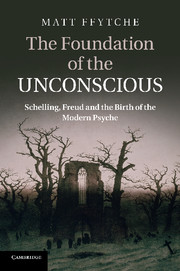Book contents
- Frontmatter
- Contents
- Acknowledgements
- Introduction: the historiography of the unconscious
- Part I The subject before the unconscious
- Part II The Romantic unconscious
- 3 Divining the individual: towards a metaphysics of the unconscious
- 4 The historical unconscious: the psyche in the Romantic human sciences
- 5 Post-idealism and the Romantic psyche
- Part III The psychoanalytic unconscious
- Bibliography
- Index
- References
3 - Divining the individual: towards a metaphysics of the unconscious
Published online by Cambridge University Press: 05 December 2011
- Frontmatter
- Contents
- Acknowledgements
- Introduction: the historiography of the unconscious
- Part I The subject before the unconscious
- Part II The Romantic unconscious
- 3 Divining the individual: towards a metaphysics of the unconscious
- 4 The historical unconscious: the psyche in the Romantic human sciences
- 5 Post-idealism and the Romantic psyche
- Part III The psychoanalytic unconscious
- Bibliography
- Index
- References
Summary
One conceives the God outside of oneself with the God within oneself. One cannot know God except through a divine principle.
C’est un ‘dieu’ (il est vrai, un dieu mortel).
By common agreement 1809, the year which saw the publication of Schelling’s essay on Human Freedom, marks a point of no return in Schelling’s intellectual development. It is his last major philosophical publication until the philosophy of mythology of the 1840s, and so brings to a close the phase of his youthful academic brilliance and inaugurates a new period of withdrawal and obscurity. It also marks the inception of a different kind of obscurity – it is the point at which Schelling’s thought becomes overtly mystical, and thus for a long time it has defined the limit of a certain kind of philosophical interest in Schelling the idealist.
This change of direction in Schelling’s work has been associated with a number of different factors. In the first place, and most broadly, it can be set in the context of a trend of ‘dark’ Romanticism affecting German literary and intellectual culture in the early nineteenth century, in which even idealism succumbs to a certain fascination with the gothic, the magical and the mysterious. In terms of Schelling’s own work, the shift follows his move to Bavaria and the Catholic South in 1806. Initially, this was as a member of the Academy of Sciences, but an oration delivered before the Academy in 1807 so impressed the Crown Prince Ludwig (in whose honour it had been given) that Schelling soon attained a relatively independent position as General Secretary of the newly founded Academy of Arts in Munich in 1808. The Munich circle brought Schelling into contact with a very different intellectual culture from that of Jena, an example being his close alliance with Franz von Baader, the quasi-Catholic philosopher, superintendent of the Bavarian mines and (from 1826) professor of theology at the University of Munich, who twinned interests in Naturphilosophie and anthropology with researches into Kabbalism. François Marquet suggests Schelling’s most consequential contact with mysticism happened during the first years of his stay in Munich, while the distinguished Schelling scholar and editor Horst Fuhrmans understood Munich as initiating a ‘great turn’ in his thinking: ‘Into the place of a Goethean world, filled with divinities, shining with beauty, whose centre was a Nature penetrated by Spirit, steps the abyssal world of Böhme reaching deep into the irrational and the dynamics of Night-hood.’
- Type
- Chapter
- Information
- The Foundation of the UnconsciousSchelling, Freud and the Birth of the Modern Psyche, pp. 99 - 137Publisher: Cambridge University PressPrint publication year: 2011



